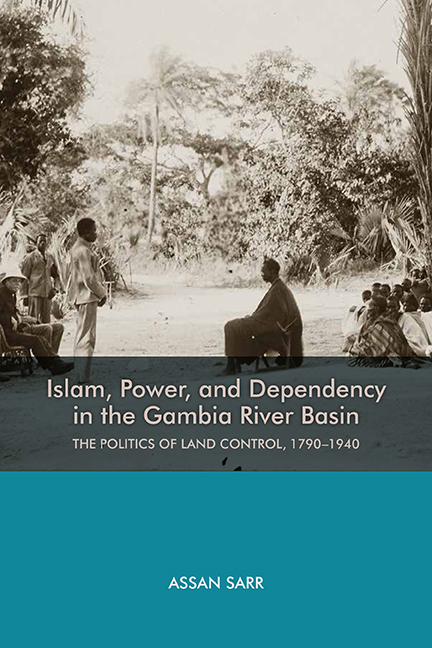Book contents
2 - Land and the Politics of Exclusion
from Part 1 - The Period of Uncontested Soninke Dominance
Published online by Cambridge University Press: 26 April 2018
Summary
Mandinka States
By the late eighteenth century, the Mandinka had succeeded in extending their political and social dominance over much of the lower Gambia River area. As the English traveler Francis Moore noted in 1730, even the king of Baddibu was a Mandinka. From Kombo to Jarra on the south bank and from Baddibu to Niumi on the north bank, it was Mandinka ruling families who were responsible for administering the several states along the banks of the Gambia River. These influential families included the Sonko, Jammeh, Manneh, Bojang, Jatta, Sanyang, and others. These several dozen families managed through the use of that political power to maintain monopoly ownership of most of the best land along the river. As a rice-growing people, the Mandinka succeeded in settling on fertile swamps and areas near the river and pushed everyone else into the jeeri. As Charlotte Quinn writes, “some of these lineages with traditions of direct descent from founder-settler ancestors claimed paramount rights of land ownership over the whole state.”
While there are diverse interpretations of the power of precolonial states and their rulers, many have noted the need for more careful historical analysis of precolonial states in Africa. Precolonial African states operated differently from European ones, and the power that African kings or rulers exercised varied. For instance, Gareth Austin notes that precolonial African rulers (in this case, the Asante) had difficulty exercising control over people. For Austin, the Asante king had limited ability to control people because the state had no standing army, or even a monopoly over conscription, and firearms were easily accessible. As for the Yoruba kings, they exercised power primarily through military force or reputation, rather than allocation of land, and they accumulated wealth in the form of people and material goods, rather than collecting tribute from settlers on their land. In this sense, African chiefs were considered only nominal custodians of the land, and a council of elders could overrule their decisions. In Nanun, in northern Ghana, “chiefs had very little authority over the people.” But the situation in the Gambia region appears to be different, because between the 1790s and the 1850s the mansolu and their courts seem to have effectively exercised control over both land and people.
- Type
- Chapter
- Information
- Islam, Power, and Dependency in the Gambia River BasinThe Politics of Land Control, 1790–1940, pp. 59 - 83Publisher: Boydell & BrewerPrint publication year: 2016

